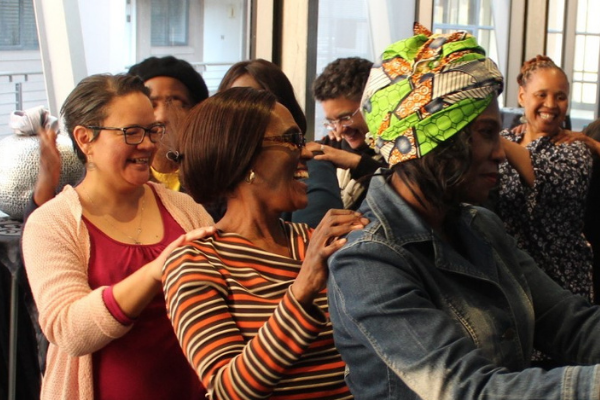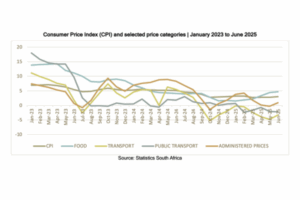1. Promoting the value of care work for a just and sustainable society
Our society functions because of the work of caring, and women perform the vast majority of unpaid and underpaid care work. Patriarchal society views care work as merely an extension of women’s work in the home and deems it less valuable than other types of work. This perception of care work’s lack of value is used to justify the precarious working conditions, low remuneration, limited training, inadequate social protection measures, and unsafe working environments that care workers face. Addressing the conditions of care workers is essential for achieving transformative change in society.
Power Up! Women advocate for bodies, voices and resources: Advocacy by a group of Volunteer Food Handlers in Gauteng for recognition and rights as workers under the National School Nutrition Programme (NSNP) can potentially catalyse a national movement and positively impact the lives of more than 60,000 people who cook and serve food to learners. Know more
2. Strengthening transformative women’s leadership development in the labour movement
Social transformation begins with a transformed leadership critically aware of their own practice of power and the way they lead. Men dominate the leadership of the labour movement and there is a continuous struggle for women to be elected into leadership positions. Even when women are in leadership positions they assume roles within an institutional culture shaped by men. A transformational leadership practice challenges patriarchal organisational cultures. Know more
3. Creating a world of work free of gender-based violence
Gender-based violence is violence directed at people because of their sex or gender and is rooted in discriminatory gender norms, practices, institutions, and laws. While sexual harassment is one of the most prevalent forms of GBV in the world of work, violence can take many forms, like psychological violence and cyberbullying, leaving workers unable to work effectively.
LRS supports unions and communities in exploring different approaches to preventing and eliminating gender-based violence in their sectors.
Health sector: Zero tolerance for GBV
What would it take to create a health system with zero tolerance for gender-based violence? Our social action initiative at a Gauteng Province clinic explores actions to reduce violence and shift perceptions about the value of care work and healthcare workers. Know more
Education sector: Ending school-related GBV
Our initiative with education unions in seven African countries shows that teachers and their unions can form partnerships to transform norms, policies, and practices that perpetuate school-related gender-based violence. Know more
Garment manufacturing and retail: Worker-led strategies for addressing GBVH
In garment factories and clothing stores, where women are the majority, gender-based violence and harassment are widespread. Our participatory action research with SACTWU and SACCAWU empowers women and other marginalised workers in factories and shops to share their experiences of GBVH and participate in decision-making processes to address it in the workplace. Know more
Working with communities to reduce gender-based violence: The Story of Letsema
Our work to eliminate GBV in communities centres on Letsema, an intervention for changing entrenched social norms in the Vaal Triangle. Letsema integrates feminist leadership with principles of organisation and community development in a Gender Action Learning (GAL) programme. Letsema has greatly influenced gender attitudes and behaviours in the Vaal. Know more
4. Using an intersectional analysis to promote Inclusion in the World of Work
Working with an intersectional approach, we can see how people’s social identities overlap and create compounded experiences of discrimination. Trade unions, as defenders of human rights, play a crucial role in addressing these intersecting forms of discrimination based on class, gender, race, sexuality, disability, age, etc, and how they deepen the inequalities workers experience. We support unions to create safe and inclusive organisations and workplaces free of homophobia. Know more
5. Feminist Pedagogy to guide our work of transforming unequal gender relations
Guided by feminist pedagogy, we recognise that knowledge is co-created through interaction, collaboration, and negotiation. Our goal is to align our practice with our values and beliefs, acknowledging the need to work holistically: with our heads through thinking and knowing, with our hearts that guide our values, and with our hands that shape our practice. View resources for facilitators and trainers







